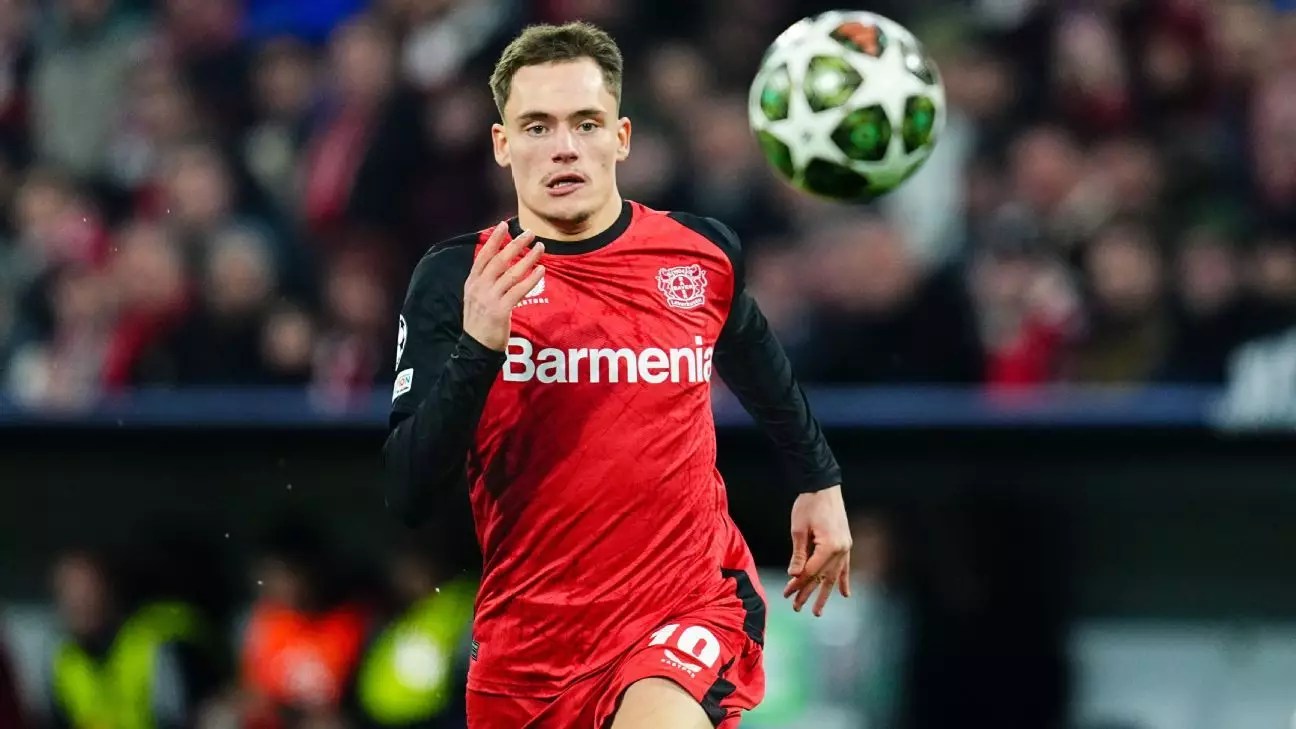In the realm of football, few events generate as much excitement and speculation as the transfer window. This summer promises to be particularly thrilling, especially for giants like Manchester City, who are reportedly willing to invest a staggering £180 million to rejuvenate their squad. The targets? Florian Wirtz from Bayer Leverkusen and Tijjani Reijnders from AC Milan. City’s management is acutely aware of the urgency to reinforce their midfield after a season devoid of trophies, and Pep Guardiola’s vision for the future is crystal clear: adaptability and tenacity must define the next iteration of the team.
Wirtz, at just 22, has emerged as a phenomenal talent, and despite fierce competition from Bayern Munich, the prospect of City’s offer could sway him towards a move that might elevate his career to new heights. Paired with Reijnders, a seasoned midfielder at 26, City aims to blend youthful exuberance with experienced finesse. Nevertheless, the financial weight of these deals raises a question—are clubs’ exorbitant expenditures justifiable or merely an arms race devoid of strategic foresight?
Marcus Rashford: A Move to Catalonia
Meanwhile, Marcus Rashford is showing a keen interest in making a switch to FC Barcelona after his stint at Manchester United. Reports suggest he’s prepared to sacrifice a portion of his hefty salary, currently at £315,000 per week, in order to secure a place at Camp Nou next season—an admirable display of ambition, yet a potentially fleeting reverence for club loyalty. His current loan at Aston Villa seems more like a strategic maneuver rather than a long-term solution for his aspirations.
Barcelona’s financial constraints make the negotiations delicate; they may aim for a loan deal with an option to buy. The rumblings of agreeing on a potential £40 million transfer fee add fuel to the fire, yet it begs the question: how sustainable is Barcelona’s financial model if top talents like Rashford are the targets? Moving forward, the focus should shift from merely acquiring stars to nurturing a coherent squad narrative that can endure challenges in both domestic and European competitions.
Rising Stars and Their Next Moves
As clubs grapple with various player transitions, others are positioning themselves for new arrivals. Take, for instance, Bayern Munich’s crown jewel, Thomas Müller, who appears steadfast in his commitment to continue his career at age 35. There was speculation around his retirement, but his intentions to explore offers from Major League Soccer (MLS) suggest that his drive for success transcends conventional boundaries.
At the same time, Inter Miami is reportedly interested in signing the revered Ángel Di María from Benfica. As the MLS secondary transfer market opens, the shrewd planning of Inter Miami is noteworthy. Aligning Di María with Lionel Messi is more than a tactical move; it’s a marketing bonanza that reinforces the club’s stature within the league and beyond. In juxtaposition, Benjamin Sesko and Xavi Simons at RB Leipzig appear set to explore greener pastures amid concerns over the club’s failure to secure European football, illustrating a growing trend of players seeking assurance and competition over loyalty.
Competitive Landscape: A Stiff Challenge Ahead
In this frenetic environment, clubs like Napoli and Real Madrid are making their own waves. Napoli is attempting to lure Jakub Kiwior from Arsenal, whereas Real Madrid, on the hunt for young talents, looks to recruit Stuttgart’s Angelo Stiller. The competitive spirit in the current market fosters a reality where clubs must prioritize a tactical vision over impulse spending. Thus, a swift adaptation to emerging talents and market demands becomes paramount.
Furthermore, the myriad of clubs monitoring Joao Pedro’s impressive performance at Brighton—such as Chelsea, Arsenal, and Liverpool—emphasizes the shifting dynamics within the Premier League. Clubs are no longer just looking at established players but are increasingly investing in depth, scouting talents who can create an impact without breaking the bank.
Legends, Youth, and Future Strategies
As big names like Cristiano Ronaldo and Luka Modric exhibit their prowess, they also highlight the delicate balance between youth and experience within squad composition. Ronaldo’s ambition to extend his playing career beyond 40 raises pivotal inquiries about athlete longevity, while Modric’s pending discussions with Real Madrid signal a club still banking on experience amidst youthful exuberance.
In the midst of this turbulent transfer milieu, it’s clear that clubs must look beyond immediate results and embrace strategies that encapsulate both competitive viability and financial sustainability. The narrative has shifted dramatically, compelling clubs to strategize comprehensively rather than falling prey to the allure of instant gratification through extravagant signings.
The upcoming transfer window is not merely a time for wheeling and dealing but serves as a vital juncture for clubs to mold their identities, attitudes, and aspirations—crafting a transformative paradigm in the beautiful game.


Leave a Reply